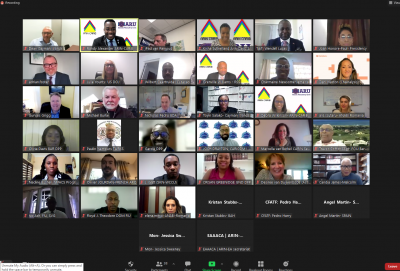
Subset of ARINCARIB Contact Points at the 2021 AGM
The 2021 Annual General Meeting of ARIN-CARIB, held virtually on December 8th and 9th, 2021 was the first since 2019 due to the Covid-19 pandemic. The high member turnout at the meeting was quite commendable, with support demonstrated by the attendance of representatives from the other ARINs and international law enforcement agencies. The Honorable Faris Al Rawi, Attorney General of Trinidad and Tobago delivered the opening remarks at the meeting and highlighted the fact that we live in a world where the interconnectivity of criminality must be matched with the interconnectivity of resources applied against criminality by law enforcement.
In emphasizing the importance of ARIN-CARIB, he pledged continuous support to the network and stressed on the need for regional bodies to consider a harmonized approach on legislative mechanisms. This would in turn have the effect of creating a “super-body”, where individual agencies can attain continuous assistance and be strategically positioned to deliver outcomes contributing to the fight against criminality.
One of the key activities of the AGM was the assigning of delegates into working groups for discussion, extraction of key outcomes and the presentation reports on the said discussion. The topics selected over the two-day period were very interesting and critical; Asset Sharing, Asset Management and Cryptocurrency managing, tracing, seizing, forfeiting and sale. The presentations were delivered by international subject-matter experts who did not shy away from having very interactive session with the delegates.
Pursuant to the break-out discussions, the key outcomes reported to the plenary are as follows:
Asset Sharing.
- In every asset sharing opportunity, the foundational premise should be taking the profit out of crime rather than seeking to profit;
- It is important to ensure that asset sharing provisions conform with international conventions such as UNCAC and UNTOC;
- Asset sharing policies ought to be formulated in such a way that it ensures the victims are prioritized.
- Where possible, the concerned jurisdictions should both bear the prosecutorial expenses as part of sharing the assets.
- In keeping with the intention to harmonize law enforcement activities in asset sharing, the Caribbean Return of Sharing and Recovered Assets Agreement is currently being deliberated on to determine the way forward. Currently, there are six member states who are on the board however, eight member state are required for the Agreement to be ratified.
Asset Management
Best practices.
- There should be a wealth of skillsets present in an Asset Management Unit (hereinafter referred to as the AMU), for example, legal personnel, law enforcement officers, valuators and forensic accountants.
- Asset Management should prioritize the preservation and sale of assets rather than the storage of such assets.
- Not every item or asset should be seized and ‘managed’ by the AMU, because maintenance costs may present a challenge. In certain cases, and where possible, the AMU should ask the judge to leave the asset with law enforcement rather than hand them over to the AMU. If the asset is not an asset which requires maintenance for example: real estate, it should be maintained by the owner with conditions, and not taken away until sale.
- There should be careful pre-planning for seizures and Asset Recovery orders.
- “Asset re-use” is a concept where during the ongoing case the assets are utilized to benefit the victims. The law enforcement officer can make an application to use the asset for a specific purpose, such as using real estate and buildings on special projects (housing) which benefits the victims of the related crime.
- With reference to cash seizures, where possible the AMU should establish bank accounts in commonly traded/seized currencies. This will help to minimize or eliminate foreign exchange value loss of monies seized.
- The management of assets should be geared at asset preservation and the AMU needs to move away from looking at it as asset storage.
Cryptocurrencies.
Practitioner-enhanced-training and sensitization sessions are needed throughout the region. These programs must include:
- Introduction to cryptocurrency markers/identifiers during investigations for example identifying recovery phrases, seed keys, hard wallets, soft wallets and software apps;
- The establishment of software infrastructure and specialist teams to deal with extracting/retrieving and storing cryptocurrencies;
- The establishment of agencies or personnel to deal with the management and sale of cryptocurrencies.
There is also an absence of legislative and regulatory clarity on cryptocurrencies throughout the region.
The AGM served as the appropriate occasion for the outgoing president, Trinidad and Tobago, to pass on the leadership baton to the Cayman Islands. Represented by Garcia Kelly and Toyin Salako from the Office of the Director of Public Prosecutions and Dean Murray who is the law enforcement representative, the Cayman Islands will assume the position of President for the 2022 calendar year. Ms. Salako outlined the proposed plans for their term in office, which will focus on the three main areas of Case Management, Asset Sharing and Education. Observing that the network is rich with knowledge and experience, she indicated that the sharing of this knowledge would contribute greatly to the enhancement and strengthening of the network. Additionally, regular training sessions facilitated by member representatives will be of particular focus during their term in office.
The Secretariat and Presidency sincerely thanked all members and facilitators who contributed to making the Annual General Meeting a memorable and successful occasion.
